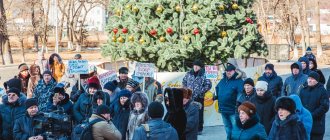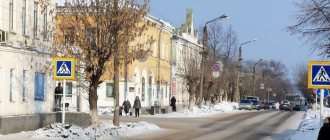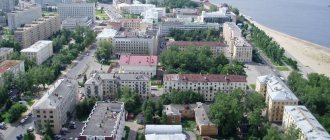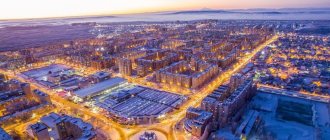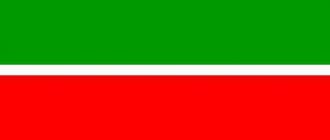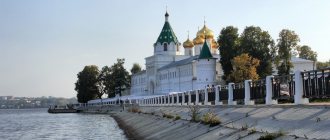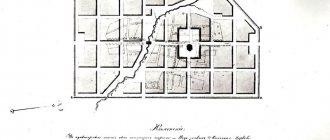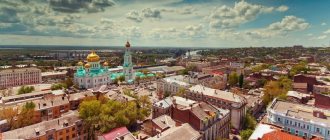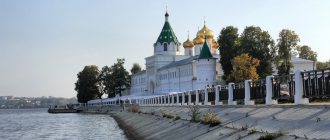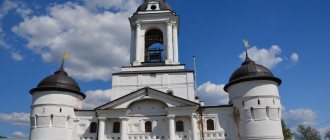This term has other meanings, see Zaprudnya (meanings).
| Settlement Zaprudnya Flag | Coat of arms |
| A country | Russia, Russia |
| Subject of the federation | Moscow regionMoscow region |
| Municipal district | Taldomsky |
| urban settlement | Zaprudnya |
| Coordinates | 56°33′39″ n. w. 37°25′40″ E. long / 56.56083° north w. 37.42778° east. d. / 56.56083; 37.42778 (G) [www.openstreetmap.org/?mlat=56.56083&mlon=37.42778&zoom=12 (O)] (Z)Coordinates: 56°33′39″ N. w. 37°25′40″ E. long / 56.56083° north w. 37.42778° east. d. / 56.56083; 37.42778 (G) [www.openstreetmap.org/?mlat=56.56083&mlon=37.42778&zoom=12 (O)] (I) |
| Head of a city settlement | Staroverov Dmitry Alekseevich[1] |
| First mention | 16th century |
| PGT with | 1932 |
| Population | ↗12,656[2] people (2016) |
| Timezone | UTC+3 |
| Telephone code | +7 49620 |
| Postcode | 141960 |
| Vehicle code | 50, 90, 150, 190, 750 |
| OKATO code | [classif.spb.ru/classificators/view/okt.php?st=A&kr=1&kod=46254558 46 254 558] |
| Official site | [zaprudnya-adm.ru ya-adm.ru] |
| Zaprudnya |
| Moscow Taldom Zaprudnya |
| Taldom Zaprudnya |
Audio, photo and video
on Wikimedia Commons
Zaprudnya
- an urban-type settlement in the Taldomsky municipal district of the Moscow region of Russia. The only settlement of the municipal formation is the urban settlement of Zaprudnya.
Population - 12,656[2] people. (2016).
Railway platform on the Verbilki - Dubna section of the Savelovsky direction of the Moscow Railway.
Story
See also: Gari (neighborhood)
The settlement of Zaprudnya has been known since the 17th century. Then, on the site of the modern village, the village of Morevskoye, located on the Kunovka River, is mentioned[3]. First mention of the name Zaprudnaya
dates back to the 18th century; it probably comes from a small dam that already existed on Kunovka at that time. In the 18th century, Zaprudnaya referred to an estate located in the village of Gari, which later became part of Zaprudnaya. In the scribe books of 1627, the village of Gari is mentioned as the patrimony of the patriarchal steward N.F. Leontyev, granted to him in 1610 by Tsar Vasily Shuisky; later the village changed owners more than once; in 1782 it became the property of Prince Mikhail Shcherbatov. In the middle of the 19th century, the village of Gary and the village of Zaprudnaya belonged to the famous doctor Karl Janisch. In 1852, the population of the village of Gari was 156 people, the village of Zaprudnaya - 168 people[3].
In 1860, in the village of Gari, a peasant from the village of Zaprudnaya, Faddem Timofeev, opened a small glass factory; During the second half of the 19th century and the beginning of the 20th century, it changed several owners, but the profile of the only enterprise in the village remained unchanged - glass production continued to expand. The development of the enterprise was also facilitated by the opening in 1900 of the Verbilki railway station on the Moscow-Savelovo line, 15 versts from the village[4]. Thanks to the efforts of one of the co-owners of the factory, I.I. Kitaigorodtsev, in 1914 the company launched the production of electric lamp glass for the first time in Russia. Already in Soviet times, the Zaprudny glass enterprise became one of the leaders in its industry; in 1924, the plant produced 35 thousand bulbs for electric lamps per day[5]. By Resolution of the Presidium of the Moscow Regional Executive Committee No. 10 of November 10, 1932 (Minutes No. 63), the working village of Zaprudnya was formed on the territory of the Taldomsky district, which included the settlements of Zaprudnya, Gari-1 and Gari-2, and under its administrative subordination - the villages of Khokhlovka and village of Verbilkovsky timber mill. Garsky and Zaprudnyansky village councils were abolished. The formation of the workers' village of Zaprudnya was approved by a resolution of the All-Russian Central Executive Committee of December 10, 1932. In the 1930s, in connection with the passage of the Moscow Canal route to Zaprudnya near the western outskirts of the village, a highway was built. In the 1950s, a railway platform was opened in Zaprudna on the line to the city of Dubna, which was then under construction[4].
The Zaprudnensky glass factory was for a long time one of the largest enterprises in the Moscow region, which led to the intensive development of the village in the 1950s - 1970s (apartment residential buildings, a hospital, schools, and kindergartens were built). The company's products included various electric lamps and picture tubes[6].
City `s history
Zaprudnya is located one hundred kilometers north of Moscow and has a long history.
The dam arose on the bank of the Kunovka River, near a dam that formed a small lake. At that time, Zaprudnya was located away from large settlements and roads. The nearest district town of Dmitrov was 30 versts away, and even the Savelovskaya railway, built at the end of the 19th century, passed through Verbilki, 15 versts from Zaprudnya. The situation changed in the middle of the 20th century, when the Moscow-Volga canal route passed not far from Zaprudnya. A highway was built along the canal, which runs near the outskirts of the village. After the war, at the end of the 40s, the construction of the Institute of Nuclear Research and the city of Dubna began, and at the same time the railway laid during the construction of the canal was restored. A small glass guta, founded in 1860 by a peasant from the village of Zaprudnaya, Fadey Timofeev, grew over a century and a half into a large industrial enterprise, and the former village grew along with it, successively including the village of Gari, the village of Khokhlovo, and the village of Competition within its borders.
The village of Zaprudnya was first mentioned in the “Scribe Books” of Dmitrovsky District 377 years ago. Then it was also known as Morevskoye. As for the main name - Zaprudnaya, by which the village was later known, its origin can be explained very simply - from the phrase “beyond the pond”. This newspeak directly testifies to the close connection of the village of Zaprudnya with the neighboring village of Gari, from which it was indeed separated only by a pond.
The village of Gari was also mentioned in the Scribe Books of 1627, but not for the first time. Thus, in the exchange “letter” of the Dmitrov prince Yuri Ivanovich and the abbot of the Trinity-Sergius Monastery, dated January 20, 1506 (!), among the exchanged wives (mowing) the “reap of Obrosimkov Ignatov’s son from Garey” is mentioned. Thus, while celebrating its 377th anniversary today, Zaprudnya has the right to celebrate its 500th anniversary in a couple of years.
The ancient village has changed many owners over the centuries. It belonged to the steward of His Holiness Patriarch N.F. Leontyev, given to his father Fyodor Leontyev by Tsar Vasily Shuisky in 1610 “for sitting under siege” during the period of the Polish intervention. Later, the village was owned by the princes Shcherbatovs, Counts Golovkins and Shuvalovs, and landowner A.F. Cheredeeva. The latter owned the village of Gari and surrounding villages during the critical period of their existence - at the turn of the 1860s.
Let’s look through the “List of populated places in the Moscow province according to information from 1859.” In the village of Gari there are 52 households with a population of 343 people and a church in the name of the Transfiguration of the Lord, known at least since 1629; in the village of Zaprudnaya there are 21 yards and 186 inhabitants; in the village of Khokhlovka (Khokhlova) there are 11 households and 78 inhabitants. Russia is actively preparing for the introduction of peasant reform. Landowners are cutting back on peasant plots, hoping to set the peasants free and without any land at all.
The most educated farmers think about the coming changes in advance. This is where the former headman of a rural community, peasant Fadey Timofeev, appears on the pages of history, who decided to brighten up his landless existence by having a handicraft factory of glass products. No sooner said than done, but it was not yet time for the peasants to argue with the landowners and merchants: the factory quickly changed owners, being sold along with 125 acres of land to the merchant P.I. Lytnev. However, Fadey Timofeev’s glass idea fell on fertile ground. Since then, no matter how the owners of glass production changed, it only expanded and multiplied.
In 1860, the factory consisted of only one furnace, which was used by its owner to make apothecary glassware. And then there was everything: elegant bottles for exquisite French perfumes, medical flasks, retorts, light bulbs...
In 1914, Isaac Ilyich Kitaygorodsky (who later became a world-famous scientist) was able to organize the production of domestic electric lamp glass at the enterprise. The Zaprudnensky plant becomes a monopolist in this type of product and remains the leader in its industry for many years.
Its owners, and later the directors, knew no rest, they were always looking for something, rebuilding, updating. During the war, they left the place and left for distant Siberia. The situation changed in the late 50s. At that time, the electronics industry began to develop rapidly in the Soviet Union, and it was decided to create a plant for the production of picture tubes on the basis of the Zaprudnensky Glass Factory. The Zaprudnensky plant was transferred to the Ministry of Electronic Industry, and houses began to be built at the plant - first two-three-story, then five-story, and in the mid-80s - nine-story houses. In 1967, for the 50th anniversary of the revolution, a three-story village administration building was built. The vocational school located on the outskirts of the village was repurposed to train personnel for the plant. They built a hospital, kindergartens, and schools. By the mid-80s, 17 thousand people lived in the village - the same as in the regional center of Taldom.
The plant grew in breadth and height, and along with it the village became prettier. And no one imagined that at the end of the twentieth century the Russian economy would fail so seriously that the products of domestic radio electronics would be unclaimed. That villages focused on city-forming enterprises will have a much more difficult time surviving than everyone else. Alas, that’s what happened. Today, a considerable number of Zaprudny residents go to work in nearby Moscow every day. The plant is going through difficult times, and this circumstance does not add to the beauty of Zaprudnya. The only thing that cannot be taken away from Russians is natural optimism.
In this photo you can see what the village church looked like in the past. It was destroyed, like most others in the distant fifties, by order of the party, and the bricks from which it was built were used to build livestock buildings. Elderly residents of Zaprudnaya recall that when the church was broken, the believers cried and behind their backs asked God to punish the atheists. We don’t know if this is true, but they say that many participants in those events paid with their health. It is difficult to judge the beauty and size of the building from this photo, but again, according to the stories of old-timers, the village church was one of the largest, most beautiful and richest in the area. They say that when the bells rang, their ringing could be heard even in Novo-Nikolskoye, and from there the domes and crosses of the domes were visible. It’s a pity that there are very few people left who remember and attended services in our church.
The wooden church in the village of Gari (now part of the village of Zaprudnya) was erected in 1701 (according to other sources, even earlier - in the 17th century). Later, a stone church (pictured) grew in its place, where chapels were consecrated in honor of the Transfiguration of the Lord, Epiphany and Intercession. For centuries, the temple nourished the surrounding flock with its services, until the Bolsheviks who came to power closed it in 1933. The last rector, priest Vladimir Speransky, despite the closure of the church, continued to serve, preached on holidays, and received parishioners at home. Wise sermons and a strong civic position could not help but irritate the authorities, and in August 1937, under a flimsy pretext, Fr. Vladimir was arrested, and on October 21, 1937, he was shot at the training ground in Butovo near Moscow. The closed temple was slowly being destroyed. In 1950, one of the managers of the Zaprudnensky glass factory, Yuri Pavlovich Sorokin, became interested in its fate - on his orders, the temple was completely dismantled. The foundation stones were transported to the village of Tanino for the construction of the first brick barn, and the walls were destroyed. Sorokin’s deed resulted in severe illness and blindness, and the site of the destroyed temple is still a wasteland to this day. For more than sixty years, bells had not sounded over Zaprudnya; parishioners traveled to Orudyevo, Zhukovka, and Dmitrov.
Urban settlement Zaprudnya
During the implementation of the Federal Law “On the general principles of organizing local self-government in the Russian Federation” (No. 131-FZ of October 6, 2003, entered into force on January 1, 2006), municipalities were created in the Moscow region.
In 2005, the law of the Moscow Region “On the status and boundaries of the Taldomsky municipal district...” [24] was adopted, according to which the municipal formation “Village Zaprudnya of the Taldomsky District of the Moscow Region” was endowed with the status of an urban settlement. It included 1 settlement - the urban-type settlement of Zaprudnya[24]. Geographical data
The area of the urban settlement is 5020 [25] or 50.2 km².
The municipality is located in the southwestern part of the Taldom municipal district, and borders[26]:
- with the urban settlement of Dmitrov, Dmitrov municipal district (in the south),
- with the rural settlement of Kulikovskoye, Dmitrov municipal district (in the west),
- with the rural settlement of Tempovskoye, Taldom municipal district (in the north),
- with the rural settlement of Guslevskoye, Taldom municipal district (in the east).
Local self-government
The local government bodies of the municipality are:[27]
- The Council of Deputies is the representative body of the urban settlement;
- head of the urban settlement;
- administration of an urban settlement - executive and administrative body of an urban settlement
- control and counting commission - a control body of an urban settlement;
The Council of Deputies consists of 15 deputies elected by the population of the urban settlement in municipal elections on the basis of equal universal and direct suffrage by secret ballot in multi-member districts[28]. The Chairman of the Council of Deputies since 2008 is Vera Vasilievna Sumina
[29]
The head of the urban settlement of Zaprudnya is elected in municipal elections by citizens living in the territory of the settlement[28]. The head of the urban settlement forms and heads the administration of the urban settlement[28]. On March 4, 2012, Dmitry Alekseevich Staroverov
[1]
Economy
The village's industry is represented by several large and medium-sized enterprises, as well as small businesses. The main enterprises are located on the industrial site of the former Zaprudnensky Electric Vacuum Devices Plant (ZZEVP); According to Rospotrebnadzor, in 2010, over 20 diverse enterprises operated in this territory[23]. Zaprudnya enterprises produce the following main types of industrial products: glassware (Zaprudnya-Steklotara LLC, part of the workshops of the former electric vacuum devices plant is involved), animal feed, wallpaper (ART LLC[6][30]). There are also small local industrial enterprises (woodworking, construction) and several farms[23].
Resumes from job seekers on the website of the Zaprudnya Employment Center
Helpful information: Searching for a job using a database of fresh vacancies on the aggregator website Rabotka.com.ru is
a modern way of successful and quick employment in Russia, the CIS, and the EAEU countries.
Employment-Center.ru
— Electronic
Employment Center of the city of Zaprudnya — a site for free placement of resumes by job seekers, including those without work experience, and job vacancies by direct employers, indicating the field of activity, city (country, region), desired level of earnings, working conditions.
Our Zaprudnya Employment Center (ZZN) will help any unemployed specialist or person who wishes to change jobs find employment. The site also solves the employment problems of the Youth Employment Center. Our electronic website allows the employer to select personnel and solve the problem of finding personnel. Jobs in the city of Zaprudnya in the form of new vacancies from direct employers can be found through a web form for forming a request to the database of vacancies for organizations, firms and companies. Detailed search capabilities of this city website of the Zaprudnya Employment Center allow an employer to find an employee and a new job for a job seeker. Our Internet portal “Center for Employment and Personnel Selection” is an electronic recruiting agency that recruits senior and middle-level personnel in organizations in cities of Russia and the CIS countries in such professional fields as: Finance, economics and accounting, Marketing and advertising, PR, HR management, Information technology, Energy, Telecommunications, Transport and road construction, Construction and architecture, Law, Manufacturing and trade.
Thousands of people are looking for work with this site, use our services too! We assure you that on our portal you can find work in any specialty in the city of Zaprudnya.
Copyright © 2011-2021 Electronic Employment Center of the city of Zaprudnya for employment of the population / Version 1.0
When using materials from this site
for electronic media it is obligatory to place a hyperlink to
www.employment-center.ru
, for printed media it is obligatory to indicate the source “
www.Employment-Center.Ru - Employment Center (vacancies and resumes)
”.
Cooperation, advertising
— emailto:
[email protected]
| Official website of the Electronic Employment Center of the city of Zaprudnya on the social network Odnoklassniki | Official website about work with vacancies and resumes Electronic Employment Center of the city of Zaprudnya on the social network VKontakte |
| Official website of the Electronic Employment Center of the city of Zaprudnya on the social network Facebook | Official website for employment and employment Electronic Employment Center of the city of Zaprudnya on the social network Twitter |
| If you encounter problems on our website with vacancies and resumes for the city of Zaprudnya , or notice an error in the operation of the Electronic Employment Center for the city of Zaprudnya , please contact the Customer Support Service of the portal Electronic Employment Center for the city of Zaprudnya by email at: [email protected] |
Copyright © 2011-2021 Software and design by Raman
Social sphere
The following institutions operate in the village: a local hospital with an ambulance substation, adult and children's clinics, a veterinary hospital, secondary school No. 1 and the Zaprudnenskaya Gymnasium municipal educational institution (until 2021 - secondary school No. 2), a branch of the Industrial-Industrial technical school in Dmitrov (until 2015 - Vocational school No. 48), a special correctional boarding school, municipal library, Children's art school (music and art schools), three kindergartens (No. 20 "Swallow", No. 21 "Stork" , No. 23 “Mishutka”). There is a police station, a fire department, a Memorial of Military Glory to the Zaprudnenets Warriors, the Antey Sports Palace, a sports and recreation complex with a Pobeda swimming pool (opened on August 1, 2015[31]), a recreation and health center Zaprudnensky Bani ", Palace of Culture "Progress" (under reconstruction), folk drama theatre, Orthodox Church of the Transfiguration[32], Church of Evangelical Christian Baptists "Awakening".
The housing stock in 2010 was 204.3 thousand m², the average supply of housing for the population was 16.9 m²/person[23]. 61.6% of the housing stock was represented by mid- and low-rise buildings; 26.8% - individual development[33]. The level of motorization was 200 cars per 1 thousand inhabitants[34].
Planning and development
In the 1950s - 1980s, the central part of Zaprudnya was built up with multi-apartment residential buildings - first three- and four-story, and since the 1960s five-story. In the late 1980s, three nine-story buildings were built. On the outskirts of the settlement there are predominantly private residential buildings[4]. The main city highways are the Zaprudnya-Verbilki highway, which crosses the settlement in the latitudinal direction (Pervomaiskaya Street, which turns into Sovetskaya Street in the eastern part of Zaprudnya); Lenin Street, parallel to Pervomaiskaya Street[23]. At the moment, several residential buildings have been built in Zaprudna to resettle residents from emergency housing[35]. The first such house was built in 2014 on Kalinina Street. Currently, the construction of a new microdistrict, located near the now abandoned camp “Koster”, continues.
Zaprudnya is located one hundred kilometers north of Moscow and has an ancient history. This settlement arose on the banks of the Kunovka River, near a dam that formed a small lake. At that distant time, Zaprudnya was located away from large settlements and roads. The village of Zaprudnya was first mentioned in the “Scribe Books” of Dmitrovsky district in 1506. Then it was also known as Morevskoye. As for the main name – Zaprudnaya, by which the village was later known, its origin can be explained very simply – from the phrase “beyond the pond”. The village of Zaprudnya was indeed separated from the neighboring village of Gari by a pond. The village of Gari was also mentioned in the Scribe Books of 1627, but not for the first time. Thus, in the exchange “letter” of the Dmitrov prince Yuri Ivanovich and the abbot of the Trinity-Sergius Monastery, dated January 20, 1506, among the exchanged wives (mowing) the “reaping of Obrosimkov Ignatov’s son from Garei” is mentioned. The history of Zaprudnya has passed its 500th anniversary. The ancient village has changed many owners over the centuries. It belonged to the steward of His Holiness Patriarch N.F. Leontyev, given to his father Fyodor Leontyev by Tsar Vasily Shuisky in 1610 “for being under siege” during the period of the Polish intervention. Later, the village was owned by the princes Shcherbatovs, Counts Golovkins and Shuvalovs, landowner A.F. Cheredeeva. The last mistress owned the village of Gari and surrounding villages during the critical period of their existence - at the turn of the 1860s. According to the “List of populated places in the Moscow province according to information from 1859,” in the village of Gari there were 52 households with a population of 343 people and a church in the name of the Transfiguration of the Lord, known at least since 1629. In the village of Zaprudnaya there are 21 courtyards and 186 residents, in the village of Khokhlovka (Khokhlova) there are 11 courtyards and 78 residents.
Zaprudnya today
Zaprudnya received the status of an urban-type settlement in 1932. Today the population is 12.6 thousand people. The village consists of three microdistricts. The main, central part is located on the right bank of the Moscow Canal between the A-104 Moscow – Dubna highway and the old Taldom road passing through the village of Tanino. In this part there is the administrative center of the urban settlement, in the vicinity of which multi-storey buildings predominate. In the rest of Zaprudnya, the houses are predominantly wooden, one-story, including in the areas of Gari and Khokhlovo, adjacent to the north, and Pervomaiskaya Street, connecting the center with the platform. A small river, Kunovka, flows through the center of the settlement. Here, in the center, one of the largest electric vacuum plants in the former USSR is located. On the outskirts of the central part of the settlement there is a railway platform “Zaprudnya”. Another microdistrict of Zaprudny is located on the left bank of the Moscow Canal near the “Competition” pier. This is a small village of Leskhoz with wooden buildings. Today, due to the closure of the ferry across the canal, this microdistrict is almost completely cut off from the main village. The last part of Zaprudnya is located three kilometers south of the central part, near the “Competition” railway station.
Former picture tube factory
A city-forming enterprise is the only large enterprise in a locality where the majority of the population works. A settlement can be small, for example, a village, most of whose residents work at a dairy plant, or it can be huge, for example, the city of Norilsk. There was such a city-forming enterprise in the village of Zaprudnya.
Even before the mid-20th century, Zaprudnya was an ordinary village. The main production was agriculture, and also a small pre-revolutionary glass factory producing tableware for local needs. The situation changed at the end of the 50s of the last century. At that time, the electronics industry began to develop rapidly in the Soviet Union, and it was decided to create a plant for the production of picture tubes on the basis of the Zaprudnensky Glass Factory. Picture tubes were also produced in Moscow, but there were not enough of them. And it wouldn’t hurt to have production facilities outside of Moscow in case of war. The Zaprudnensky plant was transferred to the Ministry of Electronic Industry. Rapid construction of infrastructure and multi-apartment residential buildings began. The vocational school located on the outskirts of the village was repurposed to train personnel for the plant. By the mid-80s, 17 thousand people already lived in the village - the same as in the regional center of Taldom. Zaprudny residents joked that the regional center is in Taldom, and not in Zaprudnya, only because there is a monument to Lenin in Taldom.
The main products of the plant were picture tubes of various types - for household televisions, for radars, and for other special equipment. Some of the products were exported. In particular, one line from the early 70s to the mid-80s produced monochrome picture tubes with a diagonal of 40 cm. They were entirely exported under a contract; such picture tubes were not used in the Soviet Union. Serious work for the plant’s specialists was mastering the production of color picture tubes for televisions. For the first time, the production of such picture tubes was mastered in Moscow, and then the technology was transferred to Zaprudnya. But there were also technologies that were first mastered in Zaprudnya. For example, it was in Zaprudny that they first mastered the connection of the screen and the neck of a picture tube using a special vacuum mastic-glue, and not by welding, as was done previously. These were the so-called 61LK4Ts glued picture tubes, which at first the TV experts did not like. Until the technology was fully developed, the mastic allowed air to pass through, and over time, the vacuum in the kinescope deteriorated, which spoiled the image quality. The plant also produced other products, for example, Geiger counters for dosimeters. The plant worked in cooperation with other enterprises. Some components and assemblies were received from other factories, for example, a certain number of electron guns for picture tubes and glass blanks for screens were brought from the Moscow plant. Special trucks for transporting glass blanks constantly plied along Dmitrovskoe Highway. The finished picture tubes went mainly to Alexandrov, to television. Finished products were shipped via railway - a railway line was built from the nearest station Competition to the plant. Some of the picture tubes were supplied to television workshops from all over the Union. On the square in front of the plant there were always cars of “pushers” from television studios from all over the country. The sales department was located in a separate two-story building, and the plant had strict access control. The plant provided work not only to the residents of the village. Specialists traveled to work from Dmitrov and Verbilki. Buses to Dmitrov, Verbilok, Taldom ran once an hour, the stop was located on the square near the factory entrance. Lenin Street also begins from the entrance. The only thing that wasn't very good was the food. Therefore, residents of Zaprudnaya went to Moscow for groceries every weekend. The village was known outside the region. In the 70s, even the traffic police department was not in Dmitrov, but in Zaprudnya, and Dmitrov residents went to Zaprudnya to take driver’s license exams.
The situation changed with the beginning of market reforms. The terrible shortage of domestic televisions in the late 80s gave way to an abundance of imported televisions in the early 90s. The output of domestic television factories has dropped to hundreds of televisions per year throughout the country. Television workshops provided cash, but they could not ensure large sales. The plant was in a fever, and there was not enough money for salaries. The ministry began to receive demands to convert production, and they promised money for this. To get this money, in 1993, under the guise of conversion, the plant dismantled the production line of halogen Geiger counters capable of capturing all types of radioactive radiation. The money received for conversion was used to pay off wage arrears. The collapse began. People left, workshops stopped, supplies of materials - non-ferrous metals - were stolen. As a result, a cottage community of former plant managers appeared on the outskirts of Zaprudnya, and the main production finally stopped. In the mid-90s, the plant management attempted to create a joint venture for the production of picture tubes. SAMSUNG acted as a partner. It was assumed that they would provide money to restore production. The plant was renamed JSC ZELTA, and the joint production was called ZELTA-SAMSUNG. But it didn’t get to production. In the meantime, the premises and territory of the plant were rented out in parts. Shops have settled in the administrative building, which can be entered from the street without a checkpoint. One of the workshops began making glass headlights for cars. In another, the production of cardboard containers was established, but when rent increased, they moved to Klin. In the third workshop, the tenants are going to start assembling furniture. Cigarettes were produced clandestinely in one of the workshops, and this became clear only after the police appeared on the premises. The most massive production at the plant at present is the production of beer bottles for.
There is nowhere in particular to work in the village except at the factory. There are several food stalls and shops, several car services. Small business is not particularly thriving in a village with a population of 16 thousand people. It’s not easy to get a job in a production facility that rents space at a factory—there’s not enough work for everyone. The only way out is to look for work outside the village. But this is not easy either - buses began to run less frequently, once every 2-3 hours. Will another settlement disappear from the map of the Moscow region?
Excerpt characterizing Zaprudnya
“It’s funny to me,” said Pierre, “that you consider yourself incapable, that your life is a spoiled life.” You have everything, everything is ahead. And you... He didn’t say that you, but his tone already showed how highly he valued his friend and how much he expected from him in the future. “How can he say that!” thought Pierre. Pierre considered Prince Andrei to be a model of all perfections precisely because Prince Andrei united to the highest degree all those qualities that Pierre did not have and which can be most closely expressed by the concept of willpower. Pierre was always amazed at Prince Andrei's ability to calmly deal with all kinds of people, his extraordinary memory, erudition (he read everything, knew everything, had an idea about everything) and most of all his ability to work and study. If Pierre was often struck by Andrei’s lack of ability for dreamy philosophizing (to which Pierre was especially prone), then in this he saw not a disadvantage, but a strength. In the best, most friendly and simple relationships, flattery or praise is necessary, just as greasing is necessary for the wheels to keep them moving. “Je suis un homme fini, [I am a finished man,” said Prince Andrei. - What can you say about me? Let’s talk about you,” he said, after a pause and smiling at his comforting thoughts. This smile was reflected on Pierre’s face at the same instant. – What can we say about me? - said Pierre, spreading his mouth into a carefree, cheerful smile. -What am I? Je suis un batard [I am an illegitimate son!] - And he suddenly blushed crimson. It was clear that he made a great effort to say this. – Sans nom, sans fortune... [No name, no fortune...] And well, really... - But he didn’t say that’s right. – I’m free for now, and I feel good. I just don’t know what to start. I wanted to seriously consult with you. Prince Andrei looked at him with kind eyes. But his glance, friendly and affectionate, still expressed the consciousness of his superiority. – You are dear to me, especially because you are the only living person among our entire world. You feel good. Choose what you want; it does not matter. You will be good everywhere, but one thing: stop going to these Kuragins and leading this life. So it doesn’t suit you: all these carousings, and hussarism, and everything... “Que voulez vous, mon cher,” said Pierre, shrugging his shoulders, “les femmes, mon cher, les femmes!” [What do you want, my dear, women, my dear, women!] “I don’t understand,” answered Andrei. – Les femmes comme il faut, [Decent women] is another matter; but les femmes Kuragin, les femmes et le vin, [Kuragin’s women, women and wine,] I don’t understand! Pierre lived with Prince Vasily Kuragin and took part in the wild life of his son Anatole, the same one who was going to be married to Prince Andrei’s sister for correction. “You know what,” said Pierre, as if an unexpectedly happy thought had come to him, “seriously, I’ve been thinking about this for a long time.” With this life I can neither decide nor think about anything. My head hurts, I have no money. Today he called me, I won’t go. - Give me your word of honor that you won’t travel? - Honestly! It was already two o'clock in the morning when Pierre left his friend. It was a June night, a St. Petersburg night, a gloomless night. Pierre got into the cab with the intention of going home. But the closer he got, the more he felt it was impossible to fall asleep that night, which seemed more like evening or morning. It was visible in the distance through the empty streets. Dear Pierre remembered that that evening the usual gambling society was supposed to gather at Anatole Kuragin's place, after which there would usually be a drinking party, ending with one of Pierre's favorite amusements. “It would be nice to go to Kuragin,” he thought. But he immediately remembered his word of honor given to Prince Andrei not to visit Kuragin. But immediately, as happens with people called spineless, he so passionately wanted to once again experience this dissolute life so familiar to him that he decided to go. And immediately the thought occurred to him that this word meant nothing, because even before Prince Andrei, he also gave Prince Anatoly the word to be with him; Finally, he thought that all these honest words were such conventional things that had no definite meaning, especially if you realized that maybe tomorrow he would either die or something so extraordinary would happen to him that there would no longer be any honest , nor dishonest. This kind of reasoning, destroying all his decisions and assumptions, often came to Pierre. He went to Kuragin. Having arrived at the porch of a large house near the horse guards barracks in which Anatole lived, he climbed onto the illuminated porch, onto the stairs, and entered the open door. There was no one in the hall; there were empty bottles, raincoats, and galoshes lying around; there was a smell of wine, and distant talking and shouting could be heard. The game and dinner were already over, but the guests had not yet left. Pierre took off his cloak and entered the first room, where the remains of dinner were standing and one footman, thinking that no one was seeing him, was secretly finishing off unfinished glasses. From the third room you could hear fuss, laughter, screams of familiar voices and the roar of a bear. About eight young people crowded anxiously around the open window. The three were busy with a young bear, which one was dragging on a chain, frightening the other with it. - I'll give Stevens a hundred! - one shouted. - Be careful not to support! - shouted another. - I am for Dolokhov! - shouted the third. - Take them apart, Kuragin. - Well, leave Mishka, there’s a bet here. “One spirit, otherwise it’s lost,” shouted the fourth. - Yakov, give me a bottle, Yakov! - shouted the owner himself, a tall handsome man standing in the middle of the crowd wearing only a thin shirt open at the middle of his chest. - Stop, gentlemen. Here he is Petrusha, dear friend,” he turned to Pierre. Another voice of a short man with clear blue eyes, which was especially striking among all these drunken voices with its sober expression, shouted from the window: “Come here - settle the bet!” It was Dolokhov, a Semyonov officer, a famous gambler and brigand who lived with Anatole. Pierre smiled, looking around him cheerfully. - I don’t understand anything. What's the matter? - Wait, he's not drunk. Give me the bottle,” said Anatole and, taking a glass from the table, approached Pierre. - First of all, drink. Pierre began drinking glass after glass, looking from under his brows at the drunken guests who were again crowded at the window, and listening to their conversation. Anatole poured him wine and told him that Dolokhov was betting with the Englishman Stevens, a sailor who was here, that he, Dolokhov, would drink a bottle of rum while sitting on the third floor window with his legs hanging out. - Well, drink it all! - said Anatole, handing the last glass to Pierre, - otherwise I won’t let you in! “No, I don’t want to,” Pierre said, pushing Anatole away and went to the window. Dolokhov held the Englishman’s hand and clearly, distinctly spelled out the terms of the bet, addressing mainly Anatole and Pierre. Dolokhov was a man of average height, with curly hair and light blue eyes. He was about twenty-five years old. He did not wear a mustache, like all infantry officers, and his mouth, the most striking feature of his face, was completely visible. The lines of this mouth were remarkably finely curved. In the middle, the upper lip energetically dropped onto the strong lower lip like a sharp wedge, and something like two smiles constantly formed in the corners, one on each side; and all together, and especially in combination with a firm, insolent, intelligent gaze, it created such an impression that it was impossible not to notice this face. Dolokhov was a poor man, without any connections. And despite the fact that Anatole lived in tens of thousands, Dolokhov lived with him and managed to position himself in such a way that Anatole and everyone who knew them respected Dolokhov more than Anatole. Dolokhov played all the games and almost always won. No matter how much he drank, he never lost his clarity of mind. Both Kuragin and Dolokhov at that time were celebrities in the world of rakes and revelers in St. Petersburg. A bottle of rum was brought; the frame that did not allow anyone to sit on the outer slope of the window was broken out by two footmen, apparently in a hurry and timid from the advice and shouts of the surrounding gentlemen. Anatole walked up to the window with his victorious look. He wanted to break something. He pushed the lackeys away and pulled the frame, but the frame did not give up. He broke the glass. “Well, how are you, strong man,” he turned to Pierre. Pierre took hold of the crossbars, pulled, and with a crash the oak frame turned out. “Get out, otherwise they’ll think I’m holding on,” said Dolokhov. “The Englishman is bragging... huh?... good?...” said Anatole. “Okay,” said Pierre, looking at Dolokhov, who, taking a bottle of rum in his hands, was approaching the window from which the light of the sky and the morning and evening dawns merging on it could be seen. Dolokhov, with a bottle of rum in his hand, jumped up onto the window. "Listen!" he shouted, standing on the windowsill and turning into the room. Everyone fell silent. - I bet (he spoke French so that an Englishman could understand him, and did not speak this language very well). I bet you fifty imperials, would you like a hundred? - he added, turning to the Englishman. “No, fifty,” said the Englishman. - Okay, for fifty imperials - that I will drink the entire bottle of rum without taking it from my mouth, I will drink it while sitting outside the window, right here (he bent down and showed the sloping ledge of the wall outside the window) and without holding on to anything... So? ... “Very good,” said the Englishman. Anatole turned to the Englishman and, taking him by the button of his tailcoat and looking down at him (the Englishman was short), began repeating to him the terms of the bet in English. - Wait! - Dolokhov shouted, banging the bottle on the window to attract attention. - Wait, Kuragin; listen. If anyone does the same, then I pay one hundred imperials. Do you understand? The Englishman nodded his head, not giving any indication as to whether he intended to accept this new bet or not. Anatole did not let go of the Englishman and, despite the fact that he nodded, letting him know that he understood everything, Anatole translated Dolokhov’s words to him in English. A young thin boy, a life hussar, who had lost that evening, climbed onto the window, leaned out and looked down. “Uh!... uh!... uh!...” he said, looking out the window at the stone sidewalk. - Attention! - Dolokhov shouted and pulled the officer from the window, who, entangled in his spurs, awkwardly jumped into the room. Having placed the bottle on the windowsill so that it would be convenient to get it, Dolokhov carefully and quietly climbed out the window. Dropping his legs and leaning both hands on the edges of the window, he measured himself, sat down, lowered his hands, moved to the right, to the left and took out a bottle. Anatole brought two candles and put them on the windowsill, although it was already quite light. Dolokhov's back in a white shirt and his curly head were illuminated from both sides. Everyone crowded around the window. The Englishman stood in front. Pierre smiled and said nothing. One of those present, older than the others, with a frightened and angry face, suddenly moved forward and wanted to grab Dolokhov by the shirt. - Gentlemen, this is nonsense; he will be killed to death,” said this more prudent man. Anatole stopped him: “Don’t touch him, you’ll scare him, he’ll kill himself.” Eh?... What then?... Eh?... Dolokhov turned around, straightening himself up and again spreading his arms. “If anyone else bothers me,” he said, rarely letting words slip through his clenched and thin lips, “I’ll bring him down here now.” Well!... Saying “well”!, he turned around again, let go of his hands, took the bottle and brought it to his mouth, threw his head back and threw his free hand up for leverage. One of the footmen, who began to pick up the glass, stopped in a bent position, not taking his eyes off the window and Dolokhov’s back. Anatole stood straight, eyes open. The Englishman, his lips thrust forward, looked from the side. The one who stopped him ran to the corner of the room and lay down on the sofa facing the wall. Pierre covered his face, and a weak smile, forgotten, remained on his face, although it now expressed horror and fear. Everyone was silent. Pierre took his hands away from his eyes: Dolokhov was still sitting in the same position, only his head was bent back, so that the curly hair of the back of his head touched the collar of his shirt, and the hand with the bottle rose higher and higher, shuddering and making an effort. The bottle was apparently emptied and at the same time rose, bending its head. “What’s taking so long?” thought Pierre. It seemed to him that more than half an hour had passed. Suddenly Dolokhov made a backward movement with his back, and his hand trembled nervously; this shudder was enough to move the entire body sitting on the sloping slope. He shifted all over, and his hand and head trembled even more, making an effort. One hand rose to grab the window sill, but dropped again. Pierre closed his eyes again and told himself that he would never open them. Suddenly he felt that everything around him was moving. He looked: Dolokhov was standing on the windowsill, his face was pale and cheerful. - Empty! He threw the bottle to the Englishman, who deftly caught it. Dolokhov jumped from the window. He smelled strongly of rum. - Great! Well done! So bet! Damn you completely! - they shouted from different sides. The Englishman took out his wallet and counted out the money. Dolokhov frowned and was silent. Pierre jumped onto the window. Gentlemen! Who wants to bet with me? “I’ll do the same,” he suddenly shouted. “And there’s no need for a bet, that’s what.” They told me to give him a bottle. I'll do it... tell me to give it. - Let it go, let it go! – said Dolokhov, smiling. - What you? crazy? Who will let you in? “Your head is spinning even on the stairs,” they spoke from different sides. - I'll drink it, give me a bottle of rum! - Pierre shouted, hitting the table with a decisive and drunken gesture, and climbed out the window. They grabbed him by the arms; but he was so strong that he pushed the one who approached him far away. “No, you can’t persuade him like that,” said Anatole, “wait, I’ll deceive him.” Look, I bet you, but tomorrow, and now we're all going to hell. “We’re going,” Pierre shouted, “we’re going!... And we’re taking Mishka with us... And he grabbed the bear, and, hugging and lifting him, began to spin around the room with him. Prince Vasily fulfilled the promise made at the evening at Anna Pavlovna's to Princess Drubetskaya, who asked him about her only son Boris. He was reported to the sovereign, and, unlike others, he was transferred to the Semenovsky Guard Regiment as an ensign. But Boris was never appointed as an adjutant or under Kutuzov, despite all the efforts and machinations of Anna Mikhailovna. Soon after Anna Pavlovna's evening, Anna Mikhailovna returned to Moscow, straight to her rich relatives Rostov, with whom she stayed in Moscow and with whom her beloved Borenka, who had just been promoted to the army and was immediately transferred to guards ensigns, had been raised and lived for years since childhood. The Guard had already left St. Petersburg on August 10, and the son, who remained in Moscow for uniforms, was supposed to catch up with her on the road to Radzivilov.
